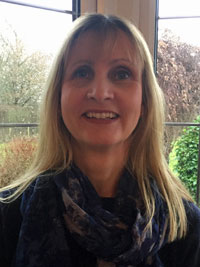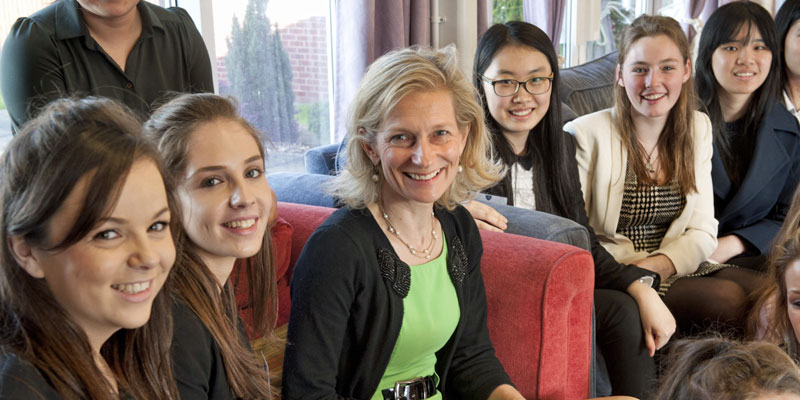Alison Matthews is an economics teacher based at Moreton Hall School in Shropshire. She left her role as an emerging markets economist in the City in 1998 and changed career to teach A-level Economics.

“…I have to ensure the students have a good understanding of basic economic theory, but I always try to apply it to the real world and make it as relevant as possible. That is the main reason why I promote my Twitter account to my students. I believe that if they do more background reading and application to the real world they will in turn enjoy economics more, and get better grades at A-level…”
Alison, please can you tell us about your career to date and what made you want to leave a career in the city to become a teacher?

I left the City in 1998 when I had my first child. By then, I had worked in the City for ten years and was doing long hours and a lot of foreign travel. I felt the time was then right to return to North Wales where I was brought up, to be nearer family. I worked in our family business for a few years while the children were young. I didn’t plan to go into teaching – it was an opportunity which presented itself. I started doing just five hours (setting up the A-level course from scratch) and I now work full time.
What does your role as a teacher involve on a day to day basis and what sort of topics do you cover?
I work five days a week as the sole economics teacher at a girls’ boarding school in Shropshire. I teach two lower sixth form classes and two upper sixth form classes. Lessons start at 8.40 and continue until 5pm. The girls start economics as a new subject at A-level. It has grown steadily in popularity over the past ten years.
Economics is a great subject because it demonstrates students have good essay writing skills, as well as the ability to handle data. A popular combination is economics, maths and physics, but girls often combine it with English, a foreign language and even art or drama.
What’s the best way to make economics relevant to your students to help them understand it?
Obviously I have to ensure the students have a good understanding of basic economic theory, but I always try to apply it to the real world and make it as relevant as possible. That is the main reason why I promote my Twitter account to my students. I believe that, if they do more background reading and application to the real world, they will in turn enjoy economics more, and get better grades at A-level.

We’re all aware of the gender gap in science, technology, engineering and maths. The same problem is also plaguing economics, but up until now, it’s received little attention. How do we address this?
My school is only girls after the age of 13, so my students are not fazed by doing economics. As a school, we always treat the students as individuals and aim to boost their confidence. We have also had a new science block recently and a lot of effort has been put into attracting girls into doing STEM subjects. But you are right, economics is still male-dominated. My son is reading economics at University and has commented on how much the male students outnumber the females.
Economics isn’t usually taught until A-level. Is there any way of getting younger children interested?

I always find students begin to engage with economics more once I teach macroeconomics, because they can then follow and understand the news, and discuss it with friends and family.
I am always pleased when they start to apply real-life topics to the theory – I recently had a student tell me that she explained to her father, during a skiing holiday, why the mountain restaurants were able to charge so much, using her knowledge of elasticity. That showed me that not only was she enjoying economics, but she was relating it to the world around her. Needless to say, this made me very proud!
Who are the women in economics you most admire and why?
- Zanny Minton Beddoes – editor of the Economist magazine and former student at my school, Moreton Hall. She did a wonderful speech at our Business Lunch held to celebrate the school’s centenary in 2014. Such an inspiration for all my students! [See main image.]
- Stephanie Flanders – she’s now at JP Morgan but when she was on the BBC I used to use her articles and video clips a lot in class. I took my students to a lecture she delivered at Liverpool University a couple of years ago. She gave an excellent talk.
- Christine Lagarde – head of the IMF, (although she is a lawyer by background) and Janet Yellen – both show that woman can get the top jobs – even though the economics world is still very male-dominated.

What is your advice to girls and women looking to work in economics?
Just do your best! If you enjoy economics, just go for it. It is a great subject and demonstrates you have a wide range of skills. I think it is important to enjoy economics and really engage with it in order to get the most out of it.
What is coming up next for you and your students?
I will be following the impact of Brexit on the UK economy closely with my students – there has never been a better time to study economics. It is so interesting to see the impact has, so far, been more positive than expected.

We will also be entering Target Two Point Zero (the Bank of England and The Times Interest Rate Challenge) again. We will also be continuing to enter share dealing competitions (the Student Investor Challenge and a local Rotary competition).
We have been to some excellent talks in the past by Stephanie Flanders, Tim Harford, Hugh Pym and attended an excellent day at the University of Warwick last term, Economics in Action, and I’m always on the lookout for more interesting ways to engage my students.
The school holds an annual careers conference to help support pupils with careers advice, and also has an initiative called Moreton Connect that aims to bridge the gap between enterprise, business and careers. The girls always look forward to these activities and so do I!
Christine Lagarde image credit: By Français : Fonds monétaire international (identité du photographe non mentionnée) [Public domain], via Wikimedia Commons





